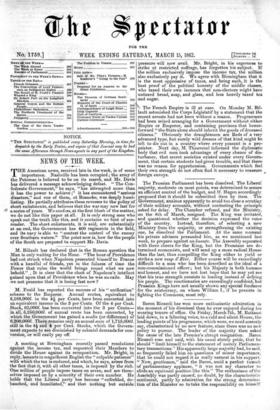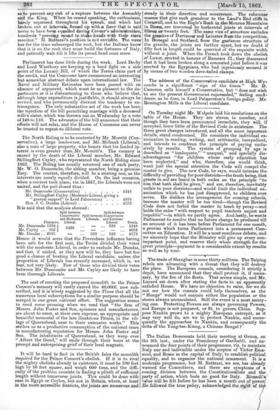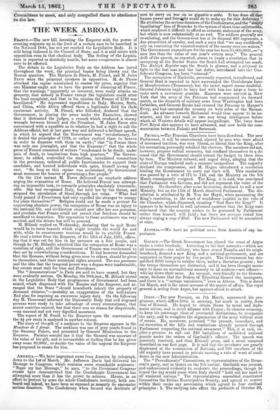NEWS OF THE WEEK.
THE American news, received late in the week, is of some importance. Nashville has been occupied ; the army of the Potomac is believed to be on its march, and Mr. Davis has delivered a message acknowledging defeat. "The Con- federate Government,' he says, "has attempted more than it has the power to achieve ;" it has encountered "serious disasters," and one of them, at Roanoke, was deeply humi- liating. He partially attributes these reverses to the policy of short enlistments, and believes that the war may now last for M. Billault has declared tihat in the Roman question the Man is only waiting for the Hour. "The hour of Providence had not struck when Napoleon presented himself to France with a handful of friends, yet in the fulness of time the Tower that rules the world brings round what we now behold." It is clear that the clock of Napoleon's intellect gained upon that of Providence when he was an exile. May we not presume that it is losing fast now ?
M. Fould has reported the success of his "unification" scheme to the Emperor. Annual rentes, equivalent to 5,188,0001. in the 4* per Cents, have been converted into • an equivalent income in the 3 per Cents. Of the 4 per Cent. Stock, 62,000/. has been converted into the 3 per Cents— in all, 5,250,000/. of annual rente has been converted, by which the Government has gained a soulte (or difference) of 6,200,000/. There remains only an annual.sum of 1,715,000/. still in the 4i- and 4 per Cent. Stocks, which the Govern- ment expects to see diminished by colonial demands for con- version, or will easily pay off.
A meeting at Birmingham recently passed resolutions against the income tax, and requested their Members to divide the House against its reimposition. Mr. Bright, in reply, laments in magnificent English the " culpable patience" with which the tax is endured, and which, he says, arises from the fact that it, with all other taxes, is imposed by the rich. One million of people impose taxes on seven, and are them- selves imposed on by a minority of their own number. He holds that the Liberal party has become "enfeebled, de- bauched, and humiliated," and that nothing but outside 0 a series of years. We confess, at the first blush of the matter, we do not like this paper at all. It is only strong men who speak out the truth like this, and it contains no hint of sur- render. The short enlistments, it is said, are substantially at an end, the Government has 400 regiments in the field, and its navy is able to "contest the control of the enemy over Southern waters." The point now is, how far the people of the South are prepared to support Mr. Davis. pressure will now avail. Mr. Bright, in his eagerness to strike at restricted suffrage, has forgotten his subject. If the million exclusively impose the income tax, the million also exclusively pay it. We agree with Birmingham that it is the most oppressive of taxes, and being such, it is the best proof of the political honesty of the middle classes, who taxed their own incomes that non-electors might have untaxed bread, soap, and glass, and less heavily taxed tea and sugar.
11/4 The French Empire is ill at ease. On Monday M. Bil- lault astonished the Corps Legislatif by a statement that the recent arrests had not been without a reason. Programmes had been seized arranging for a Government without either Empire or Emperor, and containing provisoes that hence- forward "the State alone should inherit the goods of deceased citizens." Obviously the draughtsmen are Reds of a very advanced type, but surely wild dreams of that kind might be left to die out in a country where every peasant is a pro- prietor. Next day, M. Thouvenel informed the diplomatic body that evil men took advantage of every chance of dis- turbance, that secret societies existed under every Govern- ment, that certain students had given trouble, and that there was no reason for apprehension. Governments which feel their own strength do not often find it necessary to reassure foreign envoys.
The Prussian Parliament has been dissolved. The Liberal majority, moderate on most points, was determined to secure an efficient control of the budget, and M. Hagen accordingly proposed that it should be submitted item by item. The Government; anxibuS apparently to avoid too close a scrutiny of their military accounts, without contesting the principle asked for delay. The Chamber refused, and the Ministry, on the 8th of March, resigned. The King was irritated, and• questioned whether the decision expressed the voice of the country. Instead, therefore, of selecting a new Ministry from the majority; or strengthening the existing one, he dissolved the Pirliament. At the same moment his private advisers persuaded him, as we mentioned last week, to prepare against an emmte. The Assembly separated with three cheers for the King, but the Prussians are de- termined economists, and will send up a more radical House than the last, thus compelling the King either to yield or strike a new coup d'Etat. Either course will be exceedingly difficult to a man who has been described as the ideal of a non-commissioned officer; but his Majesty is both humane and honest, and we have not lost hope that he may yet see that his true strength consists in leading instead of defying his people. The reactionaries are exceedingly confident, but Prussian Kings have not usually shown any special fondness for the aristocracy, on whom William I., if he persists in fighting the Commons, must rely.
Baron Ricasoli has won more enthusiastic admiration in the moment of his dismissal than he ever enjoyed during his wearing tenure of office. On Friday, March 7th, M. Rattazzi laid down, in a faltering voice, to a cold and silent House, the leading points of his programme, which were, we need scarcely say, characterized by no new feature, since there was no new policy to pursue. The leader of the majority then asked the cause of the late Premier's abrupt resignation. Baron Ricasoli rose and said, with his usual stately pride, that he should •" limit himself to the statement of merely Parliamen- tary transactions." His apparently large majority had, he said, so frequently failed him on questions of minor importance, that he could not regard it as really earnest in his support. "Now, gentlemen," said the Baron, amid a perfect tumult of parliamentary applause, "it was not my character to abide an equivocal position like this." The enthusiasm of the Asseinbly was partly caused, no doubt, by the characteristic sentiment, partly by admiration for the strong determina- tion of the Minister so to take the responsibility on himself as to prevent any risk of a rupture between the Assembly and the King. When be ceased speaking, the enthusiasm, barely repressed throughout his sptech, and which had broken out at intervals, flamed up with u farce that is said never to have bees equalled during Cavour's admittigtratiun, hundreds "press round te she !hands with their stern monitor." M. Rattazzi's position Is not envirible. The wave has for the time submerged the rock, but the Italians know that it is on the rock they must build the fortunes of Italy, and patiently wait till it lifts its proud head once more.
Parliament has done little during the week. Lord Derby and Lord Westbury are keeping up a bard fight on a side point of the Lunacy Bill, of which the Tories claim part of the credit, and the Commons have commeuced an interesting but aomewhat abstract debate upon international law. The Naval and Military Estimates have been passed with an absence of argument, which must be as pleasant to the de- partments as it is disheartening to those who believe that, Although large expenditure is justifiable, it should always be revised, and who permanently distrust the tendency to ex- travagance. The only substantive act of the week has been the rejection of the bill permitting marriage with a deceased wife's sister, which was thrown out on Wednesday by a vote of 148 to 116. The advocates of the bill announce that their efforts will not relax, and the House of Commons can never be trusted to repeat an illiberal vote.
The North Riding is to be contested by Mr. Morritt (Con- servative), a large landowner, and Mr. Milbank (Liberal), also a man of large property, who boasts that his landed in- terest is even greater than.:Mr. Morritt's. The vacancy is caused by the death of the Liberal member, Mr. Edward Stillingfleet Cayley, who represented the North Riding since 1882. The Riding has usually returned one of each party, Mr. W. 0. Duncombe, the sitting member, being a genuine Tory. The contest, therefore, will be a stirring one, as the interests are nearly equally divided. On the last occasion, when a contest took place, viz. in 1857, the Liberals were not united, and the poll closed thus :
Mr. Duncombe (Conservative) 5248 Mr. Stillingflest Cayley (Moderate Liberal, giving a "general support" to Lord Palmerston) . . . 4688
Hon. J. C. Dundas (Liberal) 4173 it is said that the analysis showed :
Split between Split between Conservative Split between Conservative and Moderate Liberals. and Extreme Plumpers. Liberal. Liberal. Totals.
Mr. Duncombe 1394} 628 5248
3226 ... ... Mr. Cayley ... 862 4688
Mr. Dundas ... 2995 — ... 550 628 ... 4173 Hence it would seem that the Feversham influence having been safe for the first seat, the Tories divided their votes with the moderate Liberal, in order to exclude Mr. Dundas, and that, if united, as they now will be, they have but too good a chance of beating the Liberal candidate, unless ;the proportion of Liberals has recently increased, which is, we fear, not very likely. Few of those who divided their votes between Mr. Duncombe and Mr. Cayley are likely to have been thorough Liberals.
The cost of erecting the proposed monolith to the Prince Consort's memory will vastly exceed the 40,0001. now sub- scribed, and it is wisely suggested by the Times that all the numerous local subscriptions for a similar purpose should be merged in one great national effort. The suggestion seems to need some pressing when we read that "the firm of Messrs. John Foster and Son, spinners and manufacturers, are about to erect, at their own expense, an appropriate and beautiful memorial of the late illustrious Prince, in the vil- lage of Queenshead, near to their extensive works." This strikes us as a productive consumption of the national tears in manufacturing reputation for Messrs. John Foster and Son. The inhabitants of Queenshead, as they weep over "Albert the Good," will smile through their tears at the prompt and enterprising grief of their local magnate.
It will be hard to find in the British Isles the monolith required for the Prince Consort's obelisk. If it is to rival the mighty obelisks already in existence, it must be 100 feet high by 10 feet square, and weigh 600 tons, and the diffi- culty of the problem consists in finding a plinth of sufficient length without transverse joints. This could be done with ease in Egypt or Ceylon, but not in Britain, where, at least in the more accessible districts, the joints are numerous and steady in their direction and occurrence. The columnar masses that give such grandeur to the Land's End cliffs in Cornwall, and to the Eagle's Rock in the Mourne Mountains in Down, are traversed by horizontal joints at intervals of fifteen or twenty feet. The same vice of structure excludes the granites of Dartmoor and Leinster from the competition. In Donegal and Scotland, from the gneissose structure of the granite, the joints are further apart, but we doubt if fifty feet in length could be quarried of the requisite width without a joint. When the French took down the obelisk of Luxor, erected in honour of Rameses TI., they discovered that it had been broken along a concealed joint before it was erected by the Egyptians, who had ingeniously secured it by means of two wooden dove-tailed clamps.
The -address of the Conservative candidate at High Wy- combe is a significant "sign of the times." Mr. D. Cameron calls himself a Conservative, but "does not wish to see the present :Government superseded," feeling confi- dence, as he does, in Lord Palmerston's foreign policy. Mr. Remington Mills is the Liberal candidate.
On Tuesday night Mr. Walpole laid his resolutions on the table of the House. They are eleven in number, and though they have been pronounced irresolute, they wiU, if accepted, leave little of the Revised Code in existence. The three great changes introduced, and all the more important details, stand condemned. He considers the individual ex- amination in reading, writing, and arithmetic, inexpedient, and intends to condemn the principle of paying exclu- sively by results. The system of grouping by age is described as "inadequate," " unequal," and specially dis- advantageous "for children whose early education has been neglected," and who, therefore, one would think, want just the special attention the Code will compel the master to give. The new Code, he says, would increase the difficulty of providing for poor districts—the truth being, that grants in aid are based in both codes on the principle "to him that hath shall be given," and are, therefore, inevitably unfair to poor districts—and would limit the individual ex- amination which he has just disapproved, to children over seven. He dislikes the arrangement for evening schools, because the master will be too tired—though the Revised Code does not forbid the master to teach by proxy—and holds the rules "with respect to pupil teachers unjust and impolitic"—in which we partly agree. And lastly, he wants Parliament to resolve that no future change be produced till an account of it has been before Parliament for one month, a proviso which turns Parliament into a permanent Com- mittee on Education. It will be a most cumbrous debate, and we sincerely hope that the Ministry will give up every non- important point, and reserve their whole strength for the great principle—payment to a considerable extent by results as well as by tone.
The trade of Shanghae is some thirty millions. The Taiping rebels are advancing with a threat that they will destroy the place. The European consuls, considering it strictly a depot, have announced that they shall protect it, if neces- sary, by the fire of the fleets. That seems simple, and Mr. Layard sat down after stating the facts to an apparently satisfied House. We have no objection to raise, for we do not see how the consuls could help themselves, as the " Hongs" would not contain either the population or the stores always accumulated. Still the event is a most annoy- ing one. Protecting Powers are always governing Powers, and Europe is not prepared, or fit, to govern China. Sup- pose Nankin grows to a mighty European entrepat, as it may very well do, are we to protect Nankin, and conse- quently the approaches to Nankin, and consequently the delta of the Yang-tse-Kiang, a Chinese Bengal ?
The Italian Democrats held their meeting at Genoa, on the 9th inst., under the Presidency of Garibaldi, and an- nounced the four points of their programme, viz, to maintain Italy one and indivisible under the sceptre of Victor Ema- nuel and Rome as the capital of Italy, to establish political equality, and to organize the national armament. It is a moderate programme, but M. Rattazzi, we see, has already warned the Committees, and there are symptoms of a coming division between the Constitutionalists and the party of action, which bode no good for Italy. Ricasoli's, value will be felt before he has been a month out of powerl: He followed the true policy, acknowle4ged the right of thp
Committees to meet, and only compelled them to obedience to the law.
































